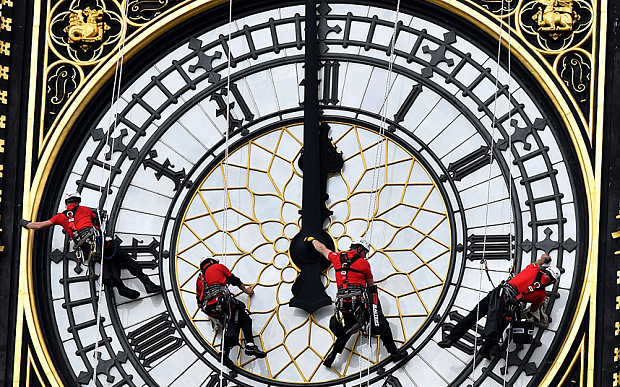| | International 
[ 2014-10-27 ] 

The clocks change tonight: five reasons to keep Daylight Savings Time all year
In the early hours of Sunday morning, the clocks
jump back an hour, making the mornings lighter and
the evenings shorter. Lobbyists have been decrying
this chronological curse for years now, urging
policymakers to adopt Daylight Savings Time - also
called British Summer Time - on a permanent basis,
prioritising sunlit evenings over bright mornings.
This would essentially align UK watches with
clocks on the continent.
In 2011, Conservative MP Rebecca Harris floated a
bill calling for year-round daylight savings. A
YouGov poll that same year found that 53pc of
Britons supported moving clocks forward an hour
permanently while 32pc opposed the change. The
proposals were met less warmly by the Scottish
population; Alex Salmond called the campaign an
attempt to “plunge Scotland into morning
darkness.”
The complaints are founded; the sun wouldn’t
rise until 10am in parts of Scotland. The
country’s 1,000-or-so dairy farmers, who wake up
before 5am, would have to work for hours in the
dark. Other farmers and construction workers, who
need sunlight to perform their jobs, would end up
working later into the evening.
Of course, we could all just get up an hour
earlier in the morning, regardless of time. But as
the economist Milton Friedman pointed out, in an
analogy for foreign exchange rates, it’s easier
to change one thing - the time, in this instance -
than dozens of habits of thousands of people.
Here are five economic reasons in favour of
Daylight Savings Time.
Conserving energy was one of the main reasons
summer clocks were moved forward in the first
place; Britain changed its clocks during the
Second World War to help save electricity and
boost working hours. A report from the Policy
Studies Institute estimated that consumers could
save £260 million a year on electricity bills -
and that was in the mid-1990s. More recently,
researchers at the University of Cambridge found
that an extra daily hour of sunlight in winter
could save £485 million each year, as people use
less electricity and heating. That has the same
effect as eliminating the carbon emissions of
70,000 people. Elizabeth Garnsey, the academic
behind the report, estimated that 0.5pc of
Britain’s energy production is currently wasted
in winter months. “This is because it tends to
get light in the mornings before most people are
awake for quite a large part of the GMT period,
whereas everybody is up and about in the early
evening," she said.
2. Think of the business benefits
Moving clocks forward by an hour would bring the
UK in line with Central European Time, which means
London would work the same business hours as
Brussels, Paris, Frankfurt and Milan. For business
that operate internationally, this could cut down
staff overtime costs - not to mention any
confusion over scheduling, from conference calls
to deliveries. It would also give the UK an extra
hour of overlap with Beijing, Tokyo and other
major import and export markets in Asia.
3. Think of the safety improvements
Though some parents have voiced concerns about
children travelling to school in the dark, winter
daylight savings could improve safety on the roads
and reduce crime. A three-year experiment to keep
British Summer Time year-round, held between 1968
and 1971, found an 11pc reduction in road
casualties in England and Wales during the hours
affected by the time change - and a 17pc reduction
in Scotland. There are roughly 50pc more fatal and
serious injuries among adults travelling during
evening rush hour than the morning peak, and three
times as many injuries among children. An extra
hour of evening daylight could save the NHS £200
million a year in accident related costs. In
addition, the Home Office believes crime would see
a 3pc drop, as crime is more likely to be
committed in the evening than in the morning.
4. Think of the tourism boost
Lighter and longer winter evenings could provide
an annual boost of £3.5 billion to the tourist
industry, according to the Tourism Alliance. The
yearly income boost from the 60-80,000 extra jobs
this would create could amount to £720 million.
Business would be inclined to stay open longer,
while tourists and locals alike would have more
time in the day to spend on outdoor recreational
activities. A report from 2010 claimed people
would gain 235 hours of post-work daylight each
year. “The tourism industry has been crying out
for extra daylight saving for years,” said
Conservative MP Rebecca Harris.
5. And if that hasn't convinced you, think of
British sports
The Football Association, The Lawn Tennis
Association and the England and Wales Cricket
Board have all backed year-round daylight savings,
and with good reason. The extra hour of daytime
increases the time available for exercise, makes
people more likely to attend evening sporting
events and means professional athletes can train
for longer. In the 1980s, the golf industry
estimated that one extra month of daylight savings
could generate up to $400 million (£246.6
million) a year in extra sales and fees.
Daylight Savings Time “affects everything from
Mid-East terrorism to the attendance at London
music halls, voter turnout to street crime,
gardening to the profits of radio stations,”
said David Prerau, author of Saving the Daylight:
Why We Put the Clocks Forward.
This debate stretches years into the past, and the
future of British time is still unclear. With this
discussion - as with the larger outcome of the
independence referendum - only time will tell.
Until that time, however, it's probably best to
change your clocks back an hour this weekend.
Source - The Telegraph

... go Back | |



